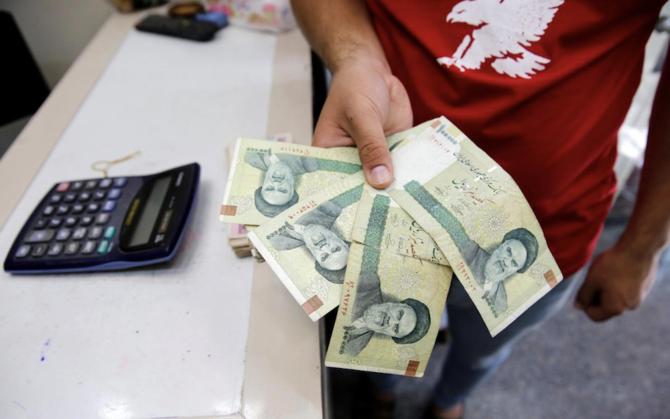BAGHDAD: Iraqi individuals and companies linked to Iran are smuggling cash out of the country to avoid financial sanctions imposed by the US Treasury.
Despite technically being denied access to US dollars by Iraq’s central bank, they are exploiting the bank’s daily auction of hard currency by employing middlemen to convert Iraqi dinars into dollars. The funds are then transferred out of Iraq using private exchange offices.
“In previous months, the daily release rate of the dollar at the currency auction was between $150 million and $180 million, sometimes up to $200 million. In the past few days it has reached $270 million,” the owner of a large currency exchange and financial transfer office in Baghdad told Arab News.
There is “no noticeable justification” for the sudden increase in dollar purchases, exchange operators said. Traders at Shorja Market, the largest wholesale market in Baghdad, told Arab News the surge in remittances could not be explained by any changes in the market, where there had been a shortage of hard cash since the end of last year.
Daily buying and selling remained weak, they said. One prominent banker told Arab News:
“Traders have nothing to do with this fever; 80 percent of the remittances that were made this week were cash transfers, and will be delivered by hand.”
On July 18, the US Treasury’s Office of Foreign Assets Control imposed financial sanctions on groups and individuals including two commanders of pro-Iranian paramilitary groups and two former governors supported by Iran. The sanctions were imposed under the Global Magnitsky Human Rights Accountability Act, targeting “perpetrators of serious human rights abuses and corruption,”and banned any financial dealings with those named.
In response, the Central Bank of Iraq issued a circular to all Iraqi banks ordering them to freeze the accounts of anyone targeted by sanctions, and prevent their access to funds.
There was a wave of criticism and anger from Iraqi politicians and leaders of armed factions, especially those associated with Iran, who complained of “unilateral sanctions that violate Iraqi sovereignty and target Iran and its allies in Iraq under the pretext of human-rights abuses and corruption.”
The protests were accompanied by heavy pressure on Iraqi Prime Minister Adel Abdul Mahdi and the governor of the central bank to change the policy. Four days later the bank issued a new circular that limited the financial freeze to US dollars only, permitting withdrawal of Iraqi dinars. It was then that the surge in dollar purchases through middlemen began.
Bankers said depositors were withdrawing their funds in Iraqi currency "to avoid attracting the attention of the US Treasury, which monitors the movement of the dollar in Iraq.”
Iraqi security officials, members of parliament and armed faction leaders told Arab News that most politicians and commanders associated with Iran, or who enjoyed its support, were “deeply concerned” as they believed they could be targeted by US Treasury sanctions at any time. This has prompted them to withdraw their money from Iraqi banks and transfer it abroad to “minimize the damage.”
“The sanctions have deeply confused and concerned them,” a senior Iraqi national security official said. “They began to withdraw their money from Iraqi banks and settle their financial assets with the Iraqi government to reduce the damage and avoid having their assets frozen and property seized in the event of sanctions.
“Our information suggests that they transfer most of the money to private companies in Dubai, and use some of it to buy property, both inside and outside Iraq.
“Actually, this is not new. They have been laundering their money for years, but what has happened now is that the sanctions have entangled them and forced them to change how they do it.”

























